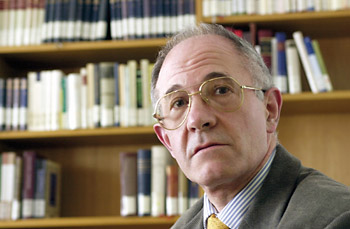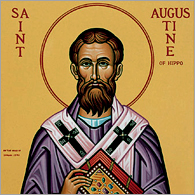The Center ≠ You’re Significant
[Ptolemy’s] astronomical system was universally accepted in the Dark and Middle Ages. The insignificance of Earth was as much a commonplace to Boethius, King Alfred, Dante, and Chaucer as it is to Mr. H.G. Wells or Professor Haldane. Statements to the contrary in modern books are due to ignorance. . . . the spatial insignificance of Earth, [was] asserted by Christian philosophers, sung by Christian poets, and commented on by Christian moralists for some fifteen centuries, without the slightest suspicion that it conflicted with their theology (C.S. Lewis, Miracles: A Preliminary Study, 78; my emphasis).
The new geocentrists teach that you are significant. In this, they faithfully echo the teaching of the Catholic Church. But they claim that you are significant because the planet you inhabit – the Earth – is the physical center of the universe. They further claim that this theology is thoroughly Catholic, being well grounded and attested to in the teaching of the Church.
While one can understand why geocentrists would find this view appealing (and certainly a good marketing tool to help promote geocentrism), the problem is that it’s false. The Catholic Church has never taught that the supposed centrality of our location in the cosmos is proof of our theological/existential significance. This theology of centrality, if you will, is alien to the teaching of the Catholic Church. In fact, in Christendom, as we will see, the common view of the center of the universe has been quite the opposite of what the geocentrists propose.
Here’s how Rick DeLano frames the issue:
That ancient world viewed Earth as the center of creation; Christendom overwhelmingly concurred. For the medievals, Earth had to be the center of the universe, since it was the place of the Incarnation of Jesus Christ, of the Son of God, for the redemption of the lost descendants of Adam (http://www.theprinciplemovie.com/blog/message-principle-producerwriter-rick-delano-people-faith/).
Implicit in this narrative is the notion that the Earth must be the physical center of the universe precisely because it’s the most important place. And if you’re in the most important place in the universe well, then, that makes you significant. Conversely, if the Earth is not the center of the universe, then that makes you insignificant.
This is bad science, which is troubling enough. But it’s also abysmal theology with dangerous ramifications, which is much, much worse. According to Catholic theology, what makes us “significant” is that God created us in His image and likeness, has a particular and unique love for us, and wants to spend all eternity with us. The proof of that unique love and relationship is not a matter of natural, deductive reasoning such as the geocentrists assert, it is a matter of Divine Revelation culminating in the life, death and resurrection of the God-man, Jesus Christ, Pentecost and the establishment of His Church for the eternal salvation of human souls.
Interestingly, it seems that some geocentrists have finally begun to notice the dramatic lack of Catholic support for geocentrism, although they have yet to grasp the most logical and obvious reason for it. For instance, in another venue, DeLano rhetorically responds to a commenter as to why a number of Protestants are getting on the geocentric bandwagon, including a couple of Protestant “bishops”, while by and large Catholics aren’t:
Why is it that the objectively heretical and schismatic [i.e. Protestants] are, thus far, more responsive, and dramatically more courageous in saying so, to the scientific evidence supporting the Catholic, Incarnational cosmos, centered upon the place of the Incarnation of the Son of God for the redemption of the descendants of Adam, than the objectively Catholic hierarchs are? “…that the thoughts of many hearts might be revealed.”
Note the twin claims here. The first is that there is a “Catholic, Incarnational cosmos” which must have the earth as its physical center. The logical implication, of course, is that any other cosmology isn’t authentically Catholic. And the second claim is common among the geocentrists: if you don’t support geocentrism, you’re cowardly – and this includes (or perhaps is particularly true) if you happen to be a Catholic bishop or pope.
So, once again, we are faced with new geocentrists’ claim that they alone are the true standard bearers of the “real” Catholic faith, as opposed to, oh, you know, every single successor to the Apostles and Vicar of Christ over the past few centuries – those faithless scoundrels who have been uniformly and utterly derelict in their duty to uphold the True Faith according to the gospel of geocentrism.
Flipping Theology On Its Head
But, unsurprisingly, it isn’t the Magisterium that has gotten things wrong, it’s the geocentrists. In fact, just as they do with the science, the new geocentrists have managed to flip Catholic theology completely on its head.
Let’s consider this fundamental point, a point that the geocentrists have somehow completely missed: For sixteen centuries, Aristotelian/Ptolomaic cosmology held sway among Christian thinkers. That cosmology considered the Earth to be in the lowest, most degraded and least privileged place in the entire universe. Indeed, as one commentator has put it, “Before Copernicus the consensus among Western scientists and theologians was, in accordance with Aristotle, that the Earth was either at, or was, the anal aperture of the universe, literally.” (J. Goldberg, The Tyranny of Cliches; link).
The simple fact is this: The Catholic Church has never put forth the supposed physical centrality of the Earth in the universe as a matter of theological importance at all, let alone as proof of man’s existential/theological significance. There’s a reason why you will never see specific references and quotes from the geocentrists to Fathers, Doctors, or Popes asserting that Catholics must believe the earth is the physical center of the universe because it’s the most significant place in the universe.
Surrendering to The Critics
 You see, what has actually happened is that the new geocentrists have bought into criticisms of modern critics who propound what has been called the “Copernican Cliché”, that with the advent of Copernicus man was “dethroned” or displaced from his privileged position at the very center of the universe. The problem is that this is a myth—it’s based on a completely fallacious view of what ancient and medieval man believed. What the geocentrists should have done is challenge these critics’ fundamental premise—instead what they’ve done is accepted that erroneous premise and from there concocted a new-fangled philosophy and theology that’s utterly alien to classical Western thought and Catholic tradition.
You see, what has actually happened is that the new geocentrists have bought into criticisms of modern critics who propound what has been called the “Copernican Cliché”, that with the advent of Copernicus man was “dethroned” or displaced from his privileged position at the very center of the universe. The problem is that this is a myth—it’s based on a completely fallacious view of what ancient and medieval man believed. What the geocentrists should have done is challenge these critics’ fundamental premise—instead what they’ve done is accepted that erroneous premise and from there concocted a new-fangled philosophy and theology that’s utterly alien to classical Western thought and Catholic tradition.
Below, you will find a survey of a number of prominent scholars who have begun to put the lie to the “Copernican Cliché”, this modern myth that somehow Copernicanism “demoted” man from a place of unique prominence and significance, based on the belief in the earth’s position at the exact center of the universe.
In a wonderful article that deserves reading in full, Professor Dennis Danielson aims a deadly salvo at the “Copernican Cliché”, which has become as ubiquitous in modern society as the myth that the educated contemporaries of Columbus believed the earth was flat:
For most pre-Copernican philosophical and astronomical authorities, geocentrism did not in fact entail or even accompany claims about earth’s or humankind’s preeminent importance. . . . There neither is, nor in the unfolding of Copernicanism has there ever been, any necessary correlation between literal, geometric centrality and “centrality” in the figurative sense of “importance” or “prominence.” The affirmation of one does not entail an affirmation of the other, nor does the denial of one entail a denial of the other (Danielson, “The Great Copernican Cliché”, American Journal of Physics, 69 (10), October 2001, p. 1030).
Danielson echoes C. S. Lewis’s observations about ancient and medieval cosmology actually seeing the earth in a disadvantaged position:
In most medieval interpretations of Aristotle’s and Ptolomy’s cosmology, earth’s position at the center of the universe was taken as evidence not of its importance but (to use a term still in circulation) its grossness. . . . Pre-Copernican cosmology pointed not to the metaphysical or axiological “centrality” but rather to the sheer grossness of humankind and its abode. In this view, the earth appears as a universal pit, figuratively as well as literally the world’s [universe’s] low point. As C. S. Lewis puts it, the medieval model is in fact not anthropocentric but “anthropoperipheral.” (ibid., p. 1031.)

http://benoit-et-moi.fr/2012%28III%29/images/brague.jpg
Historian Dr. Remy Brague, after undertaking a survey of medieval views on cosmology and the significance of man, concludes thus:
my thesis . . . can be summarized as follows: according to the pre-Copernican world-view, the central place of Earth is anything but a place of honor. Of course, the center is exactly that in the field of human societies. But this does not hold true in an astronomical context. In astronomy, the center is a humble place, even the humblest of all places (“Geocentrism as a Humiliation for Man”, in Medieval Encounters 3 (3), p.191).
Interestingly he finds only one medieval witness, a Jewish scholar, who conflated the notions of physical and existential centrality for man:
I know of only one mediaeval thinker who confused the two meanings of centrality and grounded an alleged greater worth of man on the fact that his home in the universe, namely the Earth, is located at the latter’s center. . . . He was the Jewish theologian and apologist (mutakallim) Saadia Gaon (882-942). He becomes interesting for us because he is utterly out of tune with the rest of the mediaeval concert (ibid., 193).
Brague quotes classicist A. H. Armstrong, who notes:
Geocentric cosmology did not lead the ancient astronomers and philosophers to a man-centered view of the universe, and exaggerated view of man’s importance in the scheme of things. It led them rather to stress his smallness, insignificance and lowly position in the cosmic order (ibid., 201).
Catholic theologian, Ernan McMullin critiques the common modern (including modern geocentrist) view:
that the proposed shift of the cosmic center from earth to sun effectively displaced humans from their exalted place at the center of the universe and thus had to be resisted by a Church that saw human beings as the center of God’s creation, as the privileged beings around whom the rest of the world circled (“The Church’s Ban On Copernicanism”, in The Church and Galileo, pp. 165f.)
And he then points out that this modern view simply won’t hold up to historical scrutiny:
But this will not do. It may well be what the enlightened modern would say should have been the Church’s reaction to this displacement of human beings from the center of the Creation they had occupied, unchallenged, until then. But in fact there is hardly any reference at all to this consideration in the abundant criticisms of Copernicanism from the theologians of the immediate post-1633 period. . . .
What is more, the center was not, in fact, regarded by the theologians of that day as a particularly favorable location. The abode of the blessed was at the circumference, and Bellarmine was not alone in situating hell at the center of the universe–that is, at the center of the earth. In the Aristotelian view of the matter, the earth was the locus of change, of corruption, by contrast with the serenity of the celestial regions. It was true, of course, that in the Christian vision human beings, made in the image of God, were central to the work of Creation, for on them alone was bestowed the ability, at once fatal and ennobling, to choose freely. But to go from this sort of “centrality” to the literal sort of centrality that these modern interpreters . . . have in mind is an inference that the theologians of 1616 would have been far less inclined to make than would the speculative interpreters of today (ibid.)
And philosopher Dr. Jim Slagle notes that the reality of ancient and medieval thought is exactly the opposite of what DeLano and the new geocentrists assert:
In the premodern cosmology, the closer one was to the center indicated one’s lack of significance and value, that one was less esteemed and privileged. Aristotle made a sharp distinction between the literal, geometrical center and the metaphorical, natural center, and his commentators followed suit. . . . The center is the place within a sphere furthest removed from what is outside it. . . . This cosmology was expanded upon by Ptolemy, and Ptolemy’s model was accepted throughout the Middle Ages. . . . Part of the difficulty is that we look at geocentrism and, very understandably, think of it in terms of “center.” However, for the premoderns, Earth was at the bottom of the universe. . . . Therefore, the claim that the earth is not at the center of the universe was perceived as a huge promotion for humanity, not a demotion. Indeed it was the Copernican model that was anthropocentric. . . . The equation of the center with debasement and deterioration is not an idiosyncratic interpretation: it was the received view (“The Myth of Mortification: The Cosmic Insignificance of Humanity and the Rhetoric of “Copernican Revolutions,” in Theology and Science, 11:3, pp. 291ff.; emphases his.)
C. S. Lewis noted the extent to which medieval thought did not equate physical position with significance:
Because, as Dante was to say more clearly than anyone else, the spatial order is the opposite of the spiritual, and the material cosmos mirrors, hence reverses, the reality, so that what is truly the rim seems to us the hub … We watch ‘the spectacle of the celestial dance’ from its outskirts. Our highest privilege is to imitate it in such measure as we can. The medieval Model is, if we may use the word, anthropoperipheral. We are creatures of the Margin (Discarded Image, 58; cited by Slagle, 293).
As Lewis puts it elsewhere,
[Ptolemy’s] astronomical system was universally accepted in the Dark and Middle Ages. The insignificance of Earth was as much a commonplace to Boethius, King Alfred, Dante, and Chaucer as it is to Mr. H.G. Wells or Professor Haldane. Statements to the contrary in modern books are due to ignorance . . . The spatial insignificance of Earth, [was] asserted by Christian philosophers, sung by Christian poets, and commented on by Christian moralists for some fifteen centuries, without the slightest suspicion that it conflicted with their theology (Miracles: A Preliminary Study, 53; cited by Slagle, 294).
What is more, this whole matter can actually be flipped on its head. For example, as physicist Arnold Sikkema writes:
modern astronomy suggests that not only is the earth not at the center, but that there is no centre, much like how there is no location on the surface of the earth which could rightfully claim such an honour; I consider this to be a superb poetical analogy of how once Jews claimed they had to worship in Jerusalem, but now God’s people worship anywhere in spirit and truth (see John 4:20-24). (http://reformedacademic.blogspot.com/2009/06/against-scientific-geocentrism.html)
And not only is the center theologically an unfavorable location in pre-Copernican thought, as Fr. McMullin points out, but throughout divine revelation we see that God regularly chooses the lowly to shame the great, the insignificant to rise above the mighty, the weak to triumph over the strong. The heavens proclaim the glory of God, not the significance of man (see “The Heavens Show Forth the Significance of Man?”). Indeed, was Jesus Christ born in a place of great prominence like Rome? No! He was born in the humble village of Bethlehem in the relatively insignificant country of Israel. And he was not even raised in the most important city in Israel, Jerusalem, but rather, in the backwater town of Nazareth, about which His contemporary asked condescendingly, “Can anything good come out of Nazareth?” (John 1:46).
 Given the humble realities of our Lord’s own life, it’s clear that there is no theological reason why mankind itself should not exist in a kind of cosmological backwater. That is essentially exactly what the Christian ancients and medievals believed: mankind lives in the very “sump” of the universe and only after salvation history has run its course will be elevated to heavenly glory. Modern cosmological views that don’t place earth in the physical center of the universe don’t change that one iota.
Given the humble realities of our Lord’s own life, it’s clear that there is no theological reason why mankind itself should not exist in a kind of cosmological backwater. That is essentially exactly what the Christian ancients and medievals believed: mankind lives in the very “sump” of the universe and only after salvation history has run its course will be elevated to heavenly glory. Modern cosmological views that don’t place earth in the physical center of the universe don’t change that one iota.
Again, the careful reader will note that Sungenis, DeLano and company never actually cite any specific, authoritative sources in support of their assertion of this supposed significance of the physical centrality of the earth. Where are the official Church documents that insist the earth must be the physical center of the universe, else we are no longer “significant”? Where are the Fathers and Doctors of the Church who argue, as the new geocentrists do, that the Earth must be the physical center of the universe because it’s the most significant thing in God’s creation? The answer is simple: They don’t exist.
There is also a simple reason that the new geocentrists haven’t found a single pope or Catholic bishop who supports their enterprise. And it’s not because these popes and bishops don’t know their faith, or because they’re cowards, or because some grand conspiracy has hidden the True Faith according to the gospel of geocentrism from their eyes. The reason for their failure to find support from the Catholic hierarchy is simply because there is no official Catholic teaching supporting a “Catholic, incarnational cosmos” that necessitates the earth being at the physical center of the universe.
When we look behind the geocentric curtain, we discover yet another smoke and mirror show. The fact is that geocentric “theology of centrality” marketed by Rick DeLano is alien to the Catholic faith. And so, once again, the Catholic reader is faced with a familiar choice: follow the Catholic Church or follow the new geocentrists.
For some related, brief follow-up, read: The Heavens Show Forth the Significance of Man?




